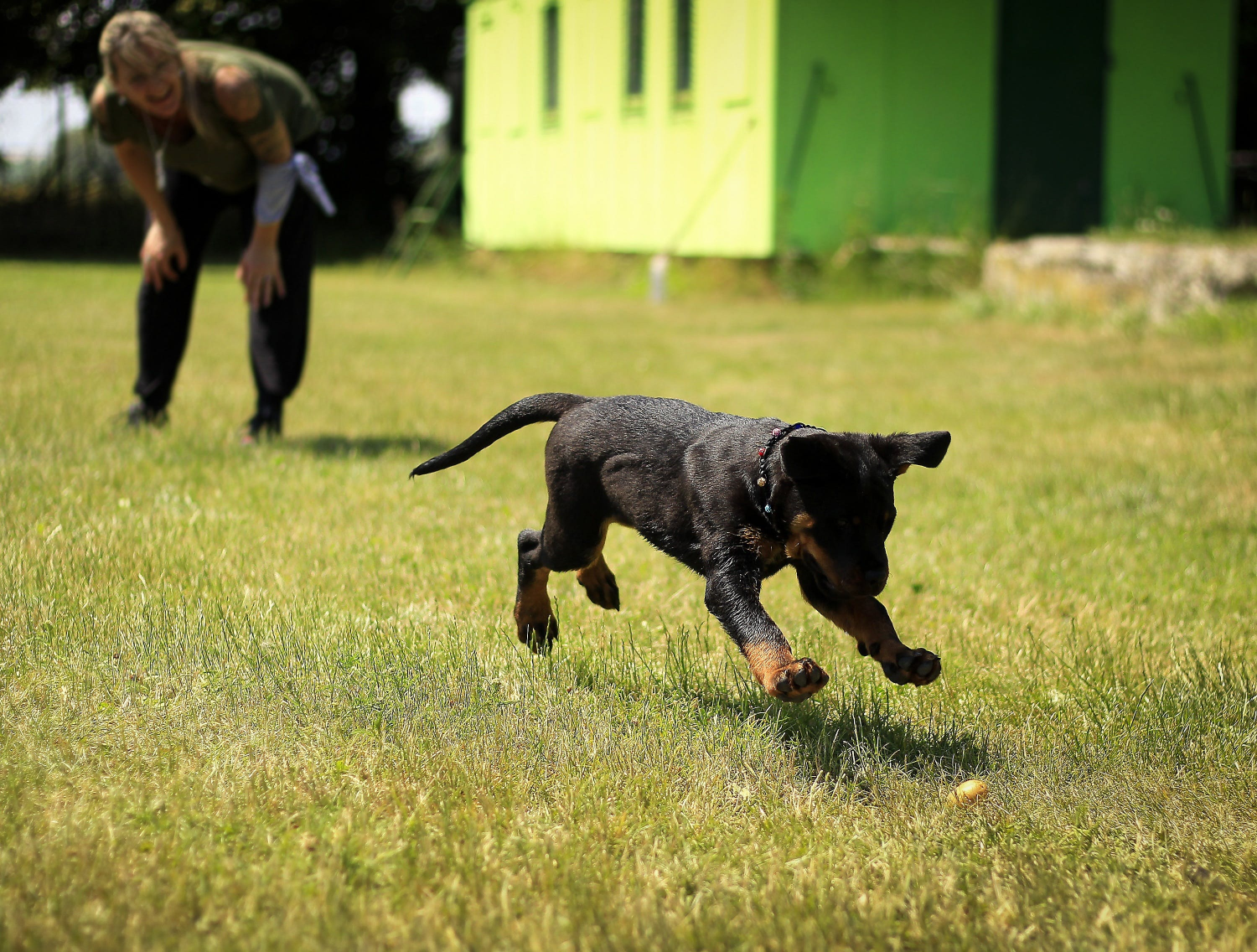Table of Contents
ToggleAre you tired of coming home to chewed-up shoes and shredded couch cushions? Do you dream of having a well-behaved, obedient pup who listens to your every command? Look no further than puppy training courses. These specialized programs are designed to teach your furry friend the essential skills they need to be the best doggo on the block.
These courses cover everything from basic obedience commands like sit and stay to more advanced tricks like rolling over and playing dead. So whether you have a mischievous little troublemaker or a rambunctious ball of energy, sign up for training courses today and unleash your dog’s full potential.
As a professional vet In this article, I will explore the benefits of puppy training courses and what you can expect when enrolling your pup in one.
5 best puppy training courses
| Name | Duration | |
| 1 | Puppy Kindergarten | 6-8 weeks |
| 2 | Puppy Start Right | 6 weeks |
| 3 | Puppy Foundations | 4 weeks |
| 4 | Puppy Prep | 4 weeks |
| 5 | Puppy Culture | Self-paced |
The Importance of Puppy Training
Puppy training involves more than simply teaching your dog to obey directions; it also entails developing a solid relationship with your pet. Puppies that have received proper training are more self-assured, less anxious, and better able to adapt to various surroundings. The following are some significant arguments in favor of puppy training:
Socialization
Socialization goes beyond helping your puppy make friends at the dog park; it lays the foundation for a well-adjusted adult dog. When properly socialized, puppies learn how to interact with other dogs safely and appropriately, avoiding behavioral issues.
Exposure to various stimuli reduces anxiety and fear as dogs grow older. Imagine taking your grown-up pup on a stroll through a crowded farmers market without them being overwhelmed or reactive; proper socialization can make this dream scenario a reality.
Engaging in proper puppy training courses emphasizing socialization isn’t just about providing your furry friend an opportunity to play with other puppies; it is about fostering adaptability and providing real-world experience during those crucial developmental stages. A well-socialized pup learns to handle different situations calmly, from encountering strangers on walks to peacefully coexisting with other pets at home.
Safety
Puppy training courses are about more than just teaching your furry friend basic commands and tricks. They are also crucial for ensuring their safety in various situations.
A well-trained puppy is more likely to respond appropriately to potentially dangerous scenarios, reducing the risk of accidents or injuries.
For example, imagine you are walking your dog near a busy road when he suddenly spots something intriguing across the street and attempts to bolt after it. With proper training, you can teach your puppy to reliably respond to commands like sit or stay, preventing them from putting themselves in harm’s way.
What to Expect in Puppy Training Courses
Puppy training courses are available in various styles, from group classes to personalized instruction. Although the organization varies, they all seek to cover the same essential concepts. When you enroll your puppy in a training program, you can expect the following:
Basic Obedience
Regarding puppy training courses, one of the main components you can expect is basic obedience training. These courses are designed to teach your puppy essential commands such as sit, stay, down, come, and leash walking. The key here is consistency and repetition. Your furry friend will need time to grasp these commands fully and apply them in various situations.
These classes often use positive reinforcement techniques to motivate your pup and encourage a good attitude. Rewards like treats or verbal praise are given when they correctly perform a command. By using positive reinforcement, trainers create a pleasant learning environment that helps establish a strong bond between you and your pup while promoting good behavior in the long run.
Crate training
One crucial aspect of puppy training courses is crate training. Crate training provides your puppy with a safe and secure space, serving as their den where they feel comfortable and relaxed. It’s essential to set the right expectations for crate training. While some puppies readily adjust to being confined in a crate, others may initially display resistance or anxiety.
During doggy training courses, instructors will guide you on making the crate a positive experience for your furry friend. Start by enticing them with treats or toys placed inside the box, gradually increasing their time at their own pace. The aim is to establish a routine that helps them associate the crate with pleasant experiences and feelings of safety rather than confinement.
Problem-solving
In training courses, problem-solving is a crucial aspect you can expect to encounter. While basic obedience commands like sit, stay, and come are essential foundations for your pup’s attitude, problem-solving sessions enable them to develop critical thinking skills and overcome behavioral challenges.
These courses provide a safe and controlled environment where trainers guide the puppy and owner in tackling issues such as housebreaking, leash pulling, or destructive chewing.
One of the critical benefits of problem-solving sessions in doggy training courses is that they address individualized concerns.
Trainers examine each pup’s unique attitude and tailor strategies accordingly. From separation anxiety to barking excessively or jumping on guests, these classes guide owners to tackle problematic manners effectively. According to research, by presenting challenging scenarios during training sessions, puppies learn how to react appropriately while owners receive personalized advice on managing their specific concerns.
Positive reinforcement
Positive reinforcement is at the heart of modern doggy training courses. It focuses on rewarding good attitudes instead of punishing bad behaviour. Positive reinforcement provides a gentle and practical approach, from teaching basic commands like sit and stay to addressing behavioural issues such as chewing or house-training.
Instead of scolding or reprimanding a puppy for doing something wrong, trainers use treats, praise, and even playtime as rewards when the puppy behaves correctly.
Positive reinforcement is proven to yield longer-lasting results compared to punishment-based methods.
In the long run, puppies trained using positive reinforcement become more confident, obedient, and well-adjusted individuals. They learn that a good attitude leads to beautiful rewards and positive experiences with their owners, motivating them to strive for excellence continually.
Trainer guidance
When enrolling in training courses, one of the most valuable aspects is the guidance trainers provide. These professionals have extensive knowledge and experience in dog manners and training techniques, making them an invaluable resource for new puppy owners. From understanding your pup’s unique needs to teaching you practical ways to communicate and bond with your furry friend, trainers guide you every step of the way.
Trainers teach basic commands such as sit, stay, and come and help address common behavioral issues like chewing, biting, or jumping. They can provide insight into the underlying reasons behind these attitudes and offer practical strategies for correction.
Benefits of Puppy Training Courses
Dog training courses provide several benefits for both your dog and you as an owner:
Improved behaviour
Puppy training sessions are beneficial for teaching your furry friend basic obedience commands and play a crucial role in improving their manners. One of the key advantages is that these courses help address behavioral issues early on, preventing them from becoming long-term problems.
Additionally, puppy training sessions provide an excellent opportunity for owners and puppies to develop a strong bond based on trust and understanding. These courses often involve interactive exercises where owners actively participate in training.
As a result, they learn to communicate effectively with their pup using clear signals and reinforce desired attitude more consistently. This improved communication fosters mutual respect and enables owners to confidently guide their puppy’s behavior.
Strengthened bond
One of the remarkable benefits of enrolling your puppy in a training course is the strengthened bond it creates between you and your furry friend. Training sessions provide positive interaction and communication between you and your pup, allowing you to understand each other better.
As you work together towards common goals, such as learning basic commands or overcoming challenges, trust is built, and the bond grows stronger. This mutual respect creates a foundation for a long-lasting relationship based on love and understanding.
Better communication
When it comes to training our new furry friends, training courses offer many benefits beyond simply teaching them basic commands. One such benefit is the improvement in communication between you and your pup.
By attending these courses, you will learn to effectively communicate with your puppy using clear cues and signals, helping them understand what is expected.
Conclusion
In conclusion, puppy training courses are a valuable investment for dogs and their owners. These courses provide essential obedience training, socialization opportunities, and guidance in addressing common behavior issues.
Owners can ensure that their furry friends develop into well-behaved and well-adjusted dogs by enrolling in a puppy training course. Additionally, these courses offer a supportive environment where owners can learn from experienced trainers and connect with other dog owners.
FAQs
1. What is a puppy training course?
A puppy training course is structured to teach puppies basic obedience commands, socialization skills, and proper manners.
2. When should I start a puppy training course?
It is recommended to start a puppy training course as early as possible, ideally between 8-12 weeks of age. This is the most critical period for socialization and learning.
3. How long does a puppy training course typically last?
The duration of a puppy training course can vary, but they usually last around 6-8 weeks. Some systems may offer additional advanced levels for continued learning.
4. What will my puppy learn in a training course?
In a puppy training course, your pup will learn essential commands like sit, stay, come, down, and walking on a leash without pulling. They will also be exposed to various social situations and learn proper manners.
5. How practical are puppy training courses?
Puppy training courses are highly effective when conducted by experienced trainers using positive reinforcement methods. Consistency and follow-through from the owner are crucial for long-term success.




